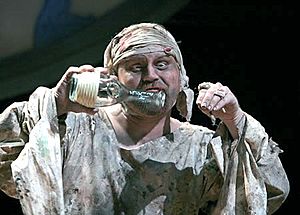Imaginary friend facts for kids
Imaginary friends are special friends that people create in their minds. They are also called pretend friends or made-up friends. These friendships happen in a person's imagination, not in the real world. Even though imaginary friends can feel very real to the people who create them, children usually know that these friends are not actually real.
Contents
What Are Imaginary Friends?
Imaginary friends are a type of phenomenon where a friendship or other connection happens only in someone's mind. It's like having a secret friend that only you can see or hear. These friends can be people, animals, or even made-up creatures. They often have their own personalities and can join in games or conversations.
When Did Imaginary Friends Appear?
The first studies about imaginary friends started in the 1890s. But the idea of imaginary companions is much older. Long ago, adults had ideas of special beings like household gods, guardian angels, or muses. These were like imaginary companions that gave comfort, advice, or ideas for creative work.
It's not clear exactly when children started having imaginary friends. Some people think it became more common in the mid-1800s. This was a time when playing and using your imagination became a very important part of childhood.
Why Do Kids Have Imaginary Friends?
Having an imaginary friend can be a normal and healthy part of growing up. Kids might create imaginary friends for many reasons, such as:
- Companionship: They might feel lonely sometimes and want someone to play with or talk to.
- Practicing social skills: Kids can try out different conversations and social situations with their imaginary friends.
- Coping with feelings: Imaginary friends can help children deal with big feelings like sadness, anger, or fear. They can be a safe way to explore these emotions.
- Creativity and imagination: It's a wonderful way for children to use their imagination and create their own stories and worlds.
- Problem-solving: Sometimes, kids might use their imaginary friends to work through problems or ideas they are thinking about.
Do Imaginary Friends Affect Development?
Many experts believe that having imaginary friends can be good for a child's development. Children who have imaginary friends often show strong creativity and good language skills. They might also be better at understanding other people's feelings. This is because they are constantly imagining different points of view and conversations.
It's important for parents and caregivers to support a child's imaginary play. This means listening to them when they talk about their imaginary friends and sometimes even playing along. This shows the child that their imagination is valued.
See also
 In Spanish: Amigo imaginario para niños
In Spanish: Amigo imaginario para niños
 | Calvin Brent |
 | Walter T. Bailey |
 | Martha Cassell Thompson |
 | Alberta Jeannette Cassell |


